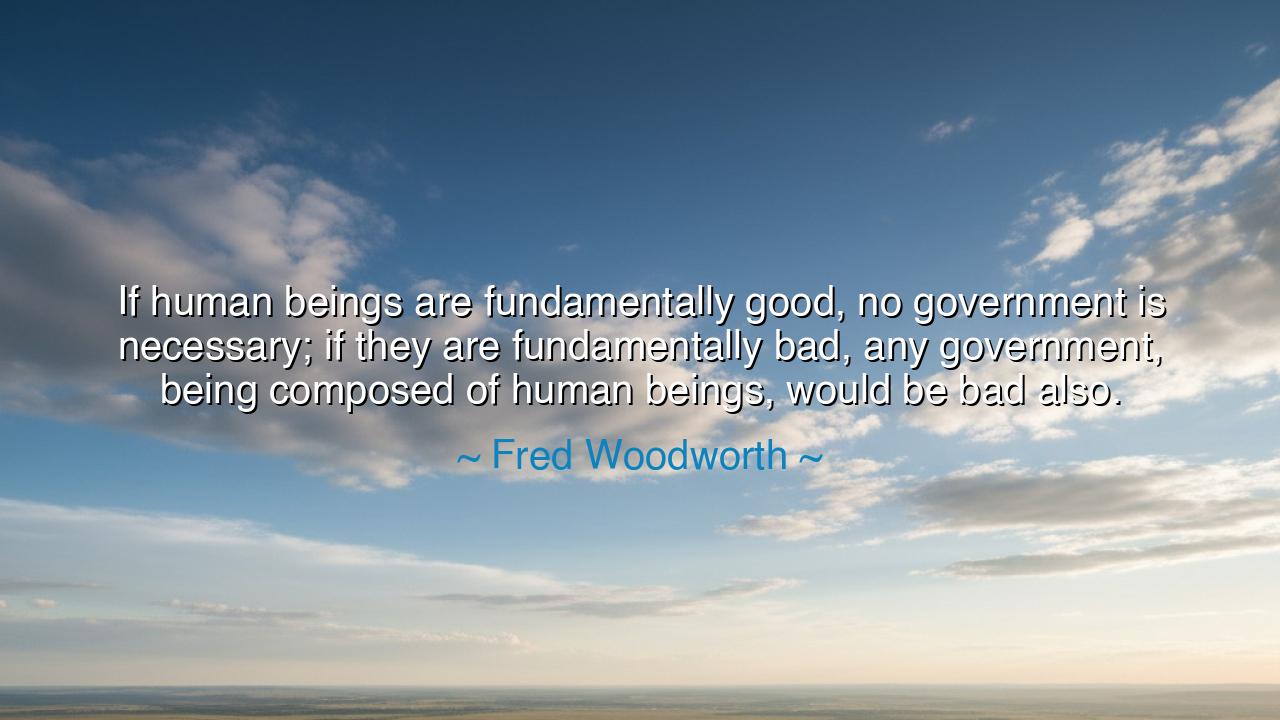
If human beings are fundamentally good, no government is
If human beings are fundamentally good, no government is necessary; if they are fundamentally bad, any government, being composed of human beings, would be bad also.






"If human beings are fundamentally good, no government is necessary; if they are fundamentally bad, any government, being composed of human beings, would be bad also." Thus spoke Fred Woodworth, the anarchist thinker and editor, a voice of sharp clarity in an age clouded by institutions and authority. In this single sentence, he poses a question that has echoed through the corridors of philosophy since the dawn of civilization — the question of whether mankind’s nature justifies the existence of power at all. His words carry both defiance and melancholy, for they strike at the very paradox that has haunted humanity from its first gathering in tribes to its vast empires and republics: if men cannot govern themselves, how shall they ever be governed by others?
Woodworth, writing in the late twentieth century, stood in the tradition of thinkers who distrusted the machinery of the state — men like Thoreau, Tolstoy, and Proudhon before him. His quote comes from his reflections on human freedom and the corruption that inevitably arises when one man holds power over another. To him, government was not merely an organization, but a mirror of the human heart. If people are good, kind, and wise, then they have no need for laws and rulers — for virtue would guide them more surely than any constitution. But if people are selfish, cruel, or ignorant, then no government, however well-designed, could rise above the flaws of those who create and operate it. Thus, Woodworth’s words form a kind of eternal paradox — a circle from which no ruler, and no ruled, can escape.
The meaning of his wisdom is clear yet unsettling: all systems of rule are reflections, not remedies. Governments do not cure human weakness; they amplify it. For every law is written by imperfect hands, and every throne is occupied by a soul tempted by power. History proves that men often create institutions to restrain evil — only for those same institutions to become instruments of oppression. When Woodworth speaks of the fundamentally good, he evokes an almost utopian vision, where conscience alone is sufficient, where people act rightly not out of fear of punishment but from inner conviction. But in the fundamentally bad, he reveals the tragedy of all government — that even in the name of order, corruption thrives, because those who govern are drawn from the same flawed clay as those they rule.
History itself stands as the great witness to his claim. Consider the Roman Republic, born from noble ideals of shared power and civic virtue. It was meant to be a system of balance — no king, only citizens governing one another. Yet over time, ambition crept in like poison. Senators sought glory, generals sought crowns, and the Republic, once proud, decayed into empire. What began as governance “for the people” ended as the dominion of emperors. The same story unfolded in the French Revolution, when men who fought to destroy tyranny built their own guillotine of terror. Woodworth’s insight reveals the pattern: the goodness of laws cannot outlive the goodness of men.
Yet his thought is not one of despair, but of awakening. By saying that no government is necessary if humans are good, Woodworth does not merely reject authority — he challenges every individual to become self-governing. The true republic, he implies, begins not in the state but in the soul. When each person acts with justice, restraint, and compassion, the need for rulers dissolves. Thus, his words are less a cry for chaos than a call for moral evolution — a vision of humanity mature enough to live by conscience rather than compulsion. This is not the anarchism of destruction, but of enlightenment — a belief that freedom and virtue are bound together, and that to achieve one without the other is impossible.
But his second truth, that bad people make bad governments, is equally vital. It reminds us that no system, however noble, can substitute for character. We may craft constitutions, elect leaders, and design checks and balances — yet if greed rules the heart, corruption will rule the state. Every empire has fallen not because its laws were weak, but because its people lost virtue. The tyranny of the few always begins with the apathy of the many. Thus, Woodworth’s words ring like a warning bell to every generation: seek not perfect systems, but better souls.
The lesson is eternal and practical: goodness cannot be legislated; it must be lived. Each person must cultivate in themselves the very qualities they wish to see in the world — honesty, courage, mercy, and humility. Do not wait for leaders to be just; be just yourself. Do not pray for governments to be kind; act kindly in your dealings. Do not curse corruption unless you have rooted out deceit in your own heart. For as long as human beings are divided between virtue and vice, no government can be entirely pure — and yet, as long as individuals strive toward goodness, no government, however flawed, can extinguish hope.
So remember the quiet, piercing wisdom of Fred Woodworth, whose words cut to the marrow of human existence: “If human beings are fundamentally good, no government is necessary; if they are fundamentally bad, any government, being composed of human beings, would be bad also.” It is not a rejection of order, but a challenge to transcend it — to build a world where the highest law is conscience, where the truest government is the self. For when humanity learns to rule its own heart with justice and compassion, then no ruler will be needed, and the earth itself will know peace.






AAdministratorAdministrator
Welcome, honored guests. Please leave a comment, we will respond soon